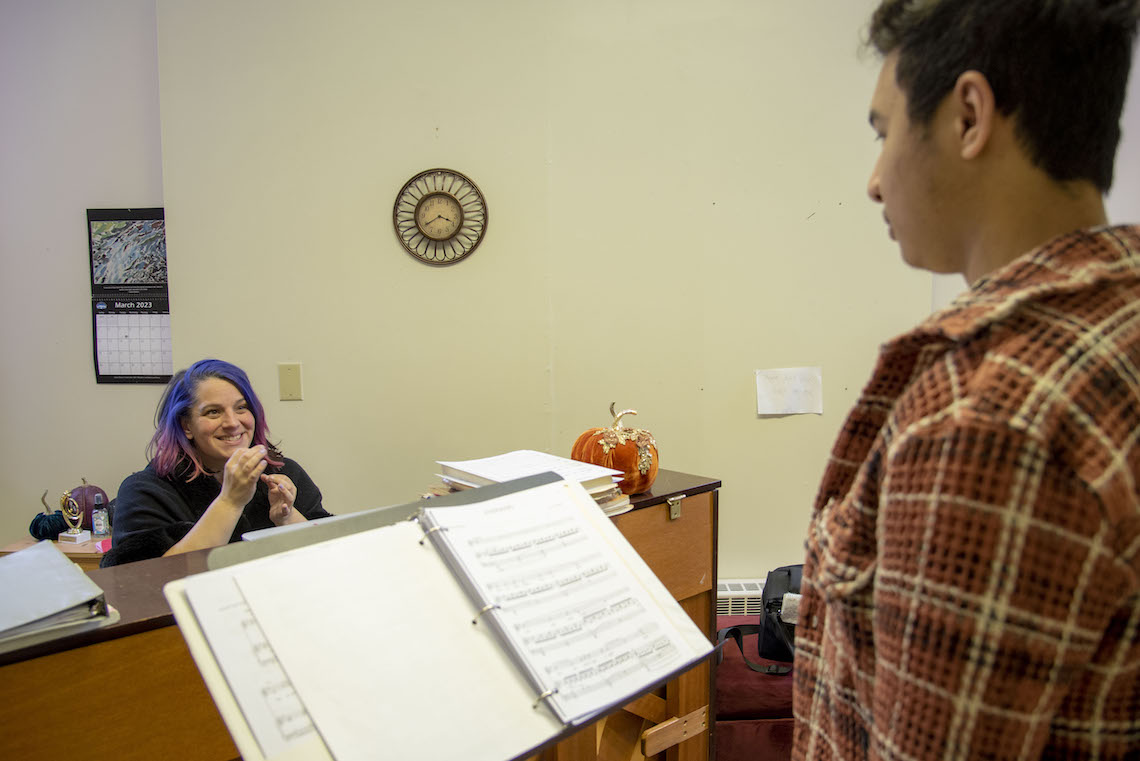
Before sending off her students to march at Commencement, Alexandra Dietrich had her own ceremony to attend.
A nomination from the Recording Academy entitled Dietrich to a seat at the 65th Annual Grammy Awards. But as she looked around at the biggest names in the music industry, it was hard to think of herself as a peer instead of a fan.
“The Flavor Flav performance at the after party, I got right up in there in the front row,” Dietrich said. “I’m, like, ‘Oh my God, middle school me is living her best life.’”
The Opera
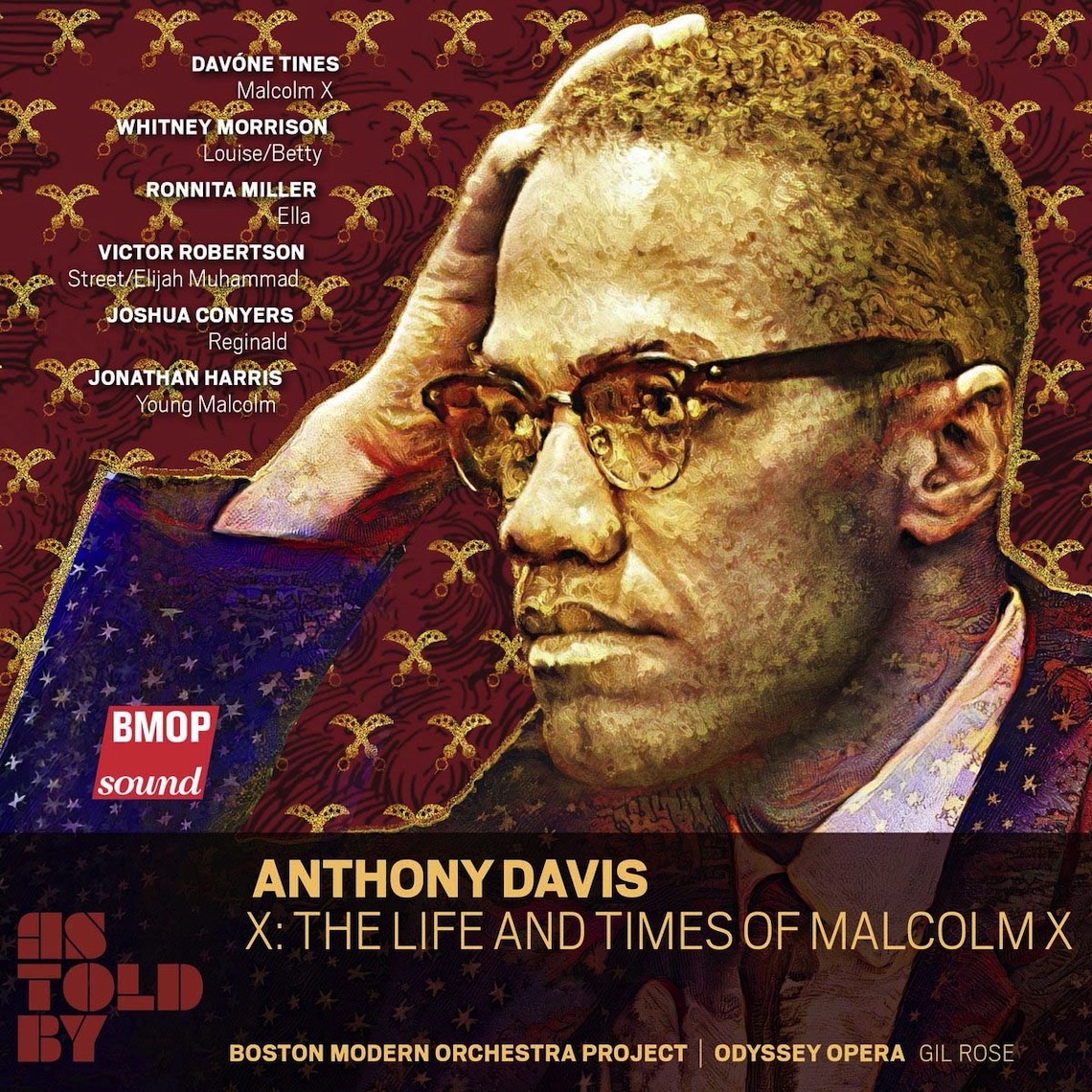
Dietrich provides vocal instruction as an artist faculty member at the University of Southern Maine’s Osher School of Music. She also practices what she teaches as a participant in both the performance and production sides of the New England arts scene. Her trip to the Grammys stemmed from her work on the opera “X: The Life and Times of Malcolm X.”
The show examines how Malcolm’s turbulent childhood and Islamic faith shaped him into a leading advocate for racial and cultural reform in 1960s America. In setting those events to music, composer Anthony Davis created a unique fusion of traditional opera and jazz. “X” premiered in 1985 but faded into obscurity after only a handful of stagings.
The Boston Modern Orchestra Project (BMOP) gave “X” a second chance to reach a broad audience. One of the orchestra’s guiding principles is to showcase works by artists of color. In support of that goal, the Mellon Foundation awarded BMOP a $1 million grant to record five operas by Black composers over a span of five years. “X” was the first opera selected.
Dietrich was involved from the start. As Associate Artistic Producer, it was her job to assemble the ensemble. Each performer needed to fit the specific vocal demands of their part. Almost all of them were descendants of the Black diaspora. The opportunity was a change for many of them, having struggled against entrenched biases in the casting process for traditional operas.
“Anyone involved in the theatrical world has heard the myth of ‘We just couldn’t find the right people,’” Dietrich said. “If you don’t see the people coming into your room to perform a work that requires a performer to bring to life an authentic lived experience then either your room isn’t perceived as safe or you haven’t looked hard enough.”
The casting call drew interest from across the country. Other performers were already well known to Dietrich from her industry contacts. The role of young Malcolm was especially hard to fill. The Boston’s Children’s Chorus answered Dietrich’s plea for help by recommending Jonathan Harris. She named him as one of her proudest finds based on the purity of his voice.
Dietrich would pop into rehearsals and address any problems that arose. It had to be just right for the one and only public performance on June 17, 2022. The 1,200 people who showed up at the Strand Theatre in Dorchester, Massachusetts, exceeded expectations. Dietrich saw the rush coming and jumped in to help the ushers work the doors.
In the short walk to their seats, several guests mentioned to Dietrich that they had met the real Malcolm X when he lived in the Boston area as a teenager. The desire to honor their memories raised the usual opening night excitement to another level.
“You could feel in the air a charge. And you could hear people having verbal responses to things occurring on stage. It was so exciting,” Dietrich said. “I’ve been involved in opera since I was 18 and I’m almost 40 now. I don’t think I’ve ever had a more emotionally satisfying moment of seeing art and social justice intertwine.”
The cast was still riding the emotional high of the performance when they returned to the auditorium two days later. This time, the seats were empty except for the sound technicians who were there to record the music for posterity. Then the awards buzz started growing.
The Grammys
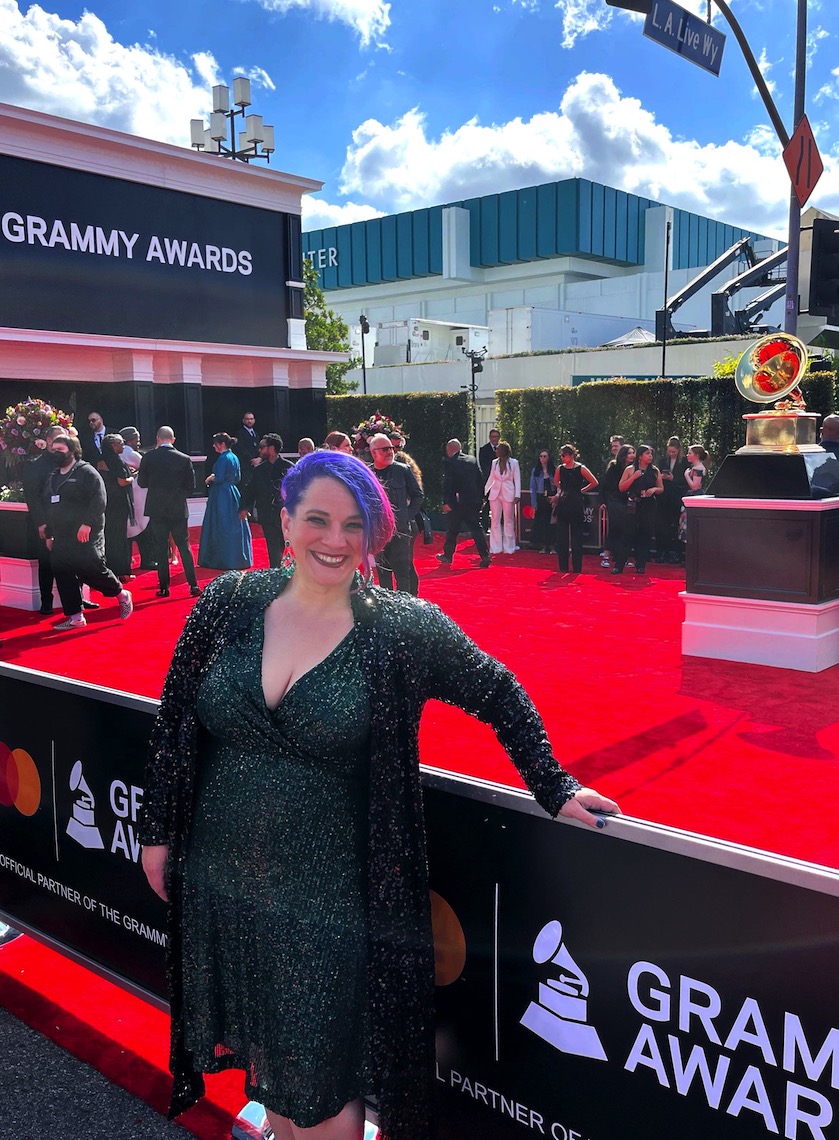
The 2022 International Opera Awards were the first major industry watchers to take notice by honoring “X” with a nomination in the category of Rediscovered Work. Dietrich made the trip to Spain for the ceremony last November. Although a different nominee ultimately won, the experience confirmed to Dietrich that “X” was a serious award contender.
However, the Grammy nominations still caught Dietrich by surprise. She was teaching a voice lesson when the announcement was made. Her student was the first to realize what was happening when Dietrich’s phone began exploding with congratulatory texts.
“Then people started running in our room ‘cause they heard us screaming,” Dietrich said. “In the middle of Gorham, it was just a circle of support and love.”
The “X” team had only been able to afford to send Dietrich and one performer to the ceremony in Spain. The cross-country trip to Los Angeles was more affordable by comparison, allowing a contingent of 12 cast and crew members to attend the Grammys. They showed up at the Crypto.com Arena on February 5 ready to celebrate.
Dietrich sparkled in a dark green gown covered in sequins. Her biggest fashion tip for future nominees is to wear comfortable shoes. The festivities begin early in the morning and run all night long. It’s easier to have fun when you’re not limping in pain.
The Grammys are divided into two rounds. The later round with its focus on pop and rock music is broadcast live on television. The gospel, musical theater, and comedy awards are not televised, however. They’re part of the earlier round, which also includes “X’s” category of Best Opera Recording.
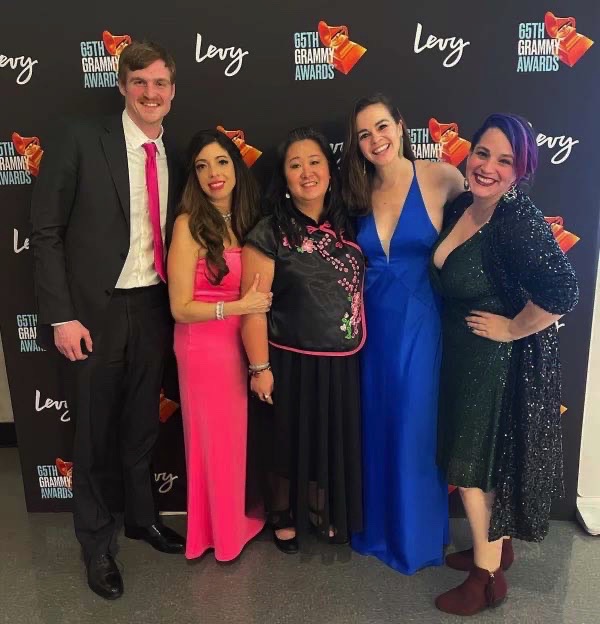
The lack of TV cameras for the early awards didn’t mean a lack of stars. Dietrich watched from a few tables away as Hollywood A-lister Viola Davis completed her EGOT by winning a Grammy for recording the audio book of her memoir. TV star Malcolm-Jamal Warner pulled double duty as a nominee for his poetry readings and as the presenter who Dietrich most wanted to hear.
The suspense built as Warner read through the nominees for Best Opera Recording, then leaned into the microphone to announce the winner: “Fire Shut Up In My Bones.” Dietrich’s congratulatory applause was genuine. She had worked with the show’s director and was happy to see him win. The pressure was now off and Dietrich was free to enjoy the rest of the day.
As the second round of awards kicked off with a Spanish-language performance by Bad Bunny, Dietrich felt a swell of pride for the Puerto Rican heritage they both share. She felt the heat from the pyrotechnic display that accompanied Sam Smith’s performance. And Adele didn’t disappoint with an acceptance speech that couldn’t air unedited on network television.
“She absolutely was cursing up a storm when she won,” Dietrich said between laughs. “That’s on my checklist. I heard Adele swear. I’m done.”
Except she wasn’t done. After the awards came the parties. Some were more exclusive than others. Dietrich couldn’t have been happier to end up in the room where Flavor Flav held court on stage. She sang along and danced and filled her phone’s memory with pictures to prove to herself that it all really happened.
The Classroom
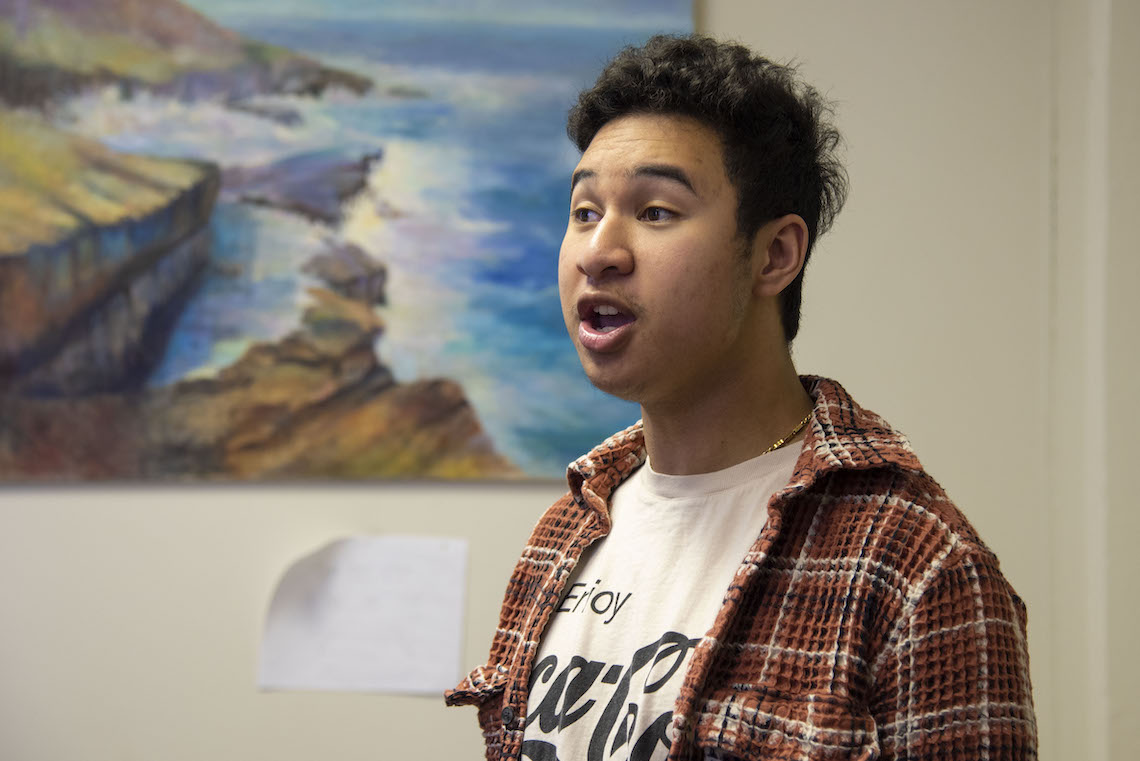
After a few days to catch up on sleep, Dietrich was back in the classroom at Corthell Hall in Gorham. She had realized her own dream and wanted to help students like Dylan Cao reach the same heights.
Cao is a Musical Theater major. After graduation, he hoped to find acting work with a summer stock theater company, then use that experience as a springboard to Broadway. But before any of that could happen, he first needed to complete his senior recital.
A typical voice lesson on March 7 found Dietrich behind the piano as she guided Cao through an English art song. They were working to extend his vocal range from tenor to countertenor. It sometimes meant reaching for notes Cao wasn’t sure he could hit cleanly. His willingness to be vulnerable is a testament to his relationship with Dietrich.
“It’s a very nurturing and an overall safe environment. When you’re at a voice lesson, it can be very pressuring depending on who the teacher is,” Cao said. “And if it doesn’t happen, it’s okay. It’s a good reminder for her to let us know, it’s not going to happen overnight sometimes. Maybe you just have to keep practicing and maybe it will come.”
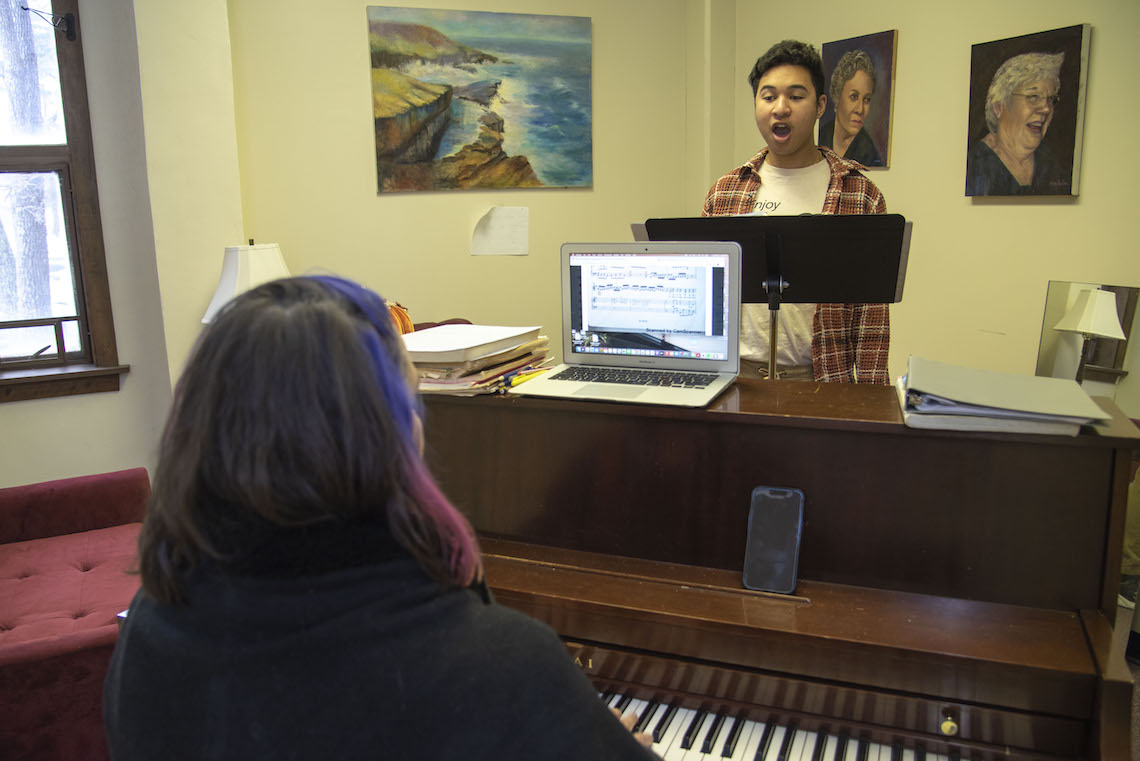
Dietrich understands what her students are feeling because she used to be one of them. She graduated from USM in 2009 with a B.A. in Musical Performance. Along the way, not every performance won Dietrich unvarnished praise.
Beloved teachers like Ellen Chickering, Robert Russell, and David Goulet gave Dietrich their honest assessments. But with their critiques came encouragement to reach the potential they saw in her. And she did. Her growth was rewarded with bigger roles and new opportunities as a stage director. Dietrich wants to give the same gift to her students.
“I don’t want to be the kind of teacher that teaches through negative reinforcement,” Dietrich said. “I want to be a teacher that my students can trust and that if something is going on they know that they’re in a safe space. I think USM provided that for me.”
From that foundation, Dietrich built a record of professional and artistic success that will continue beyond the Grammys. A busy slate of directing work will keep her traveling across the country in the months ahead. Even from a distance, she looks forward to seeing how BMOP will build off their earlier success with the next four entries in the series of recordings that began with “X.”
This year’s new opera from BMOP will tell the life story of Harriet Tubman. That will be followed by operas about Haitian revolutionary Jean-Jacques Dessalines, Frederick Douglass, and Martin Luther King.
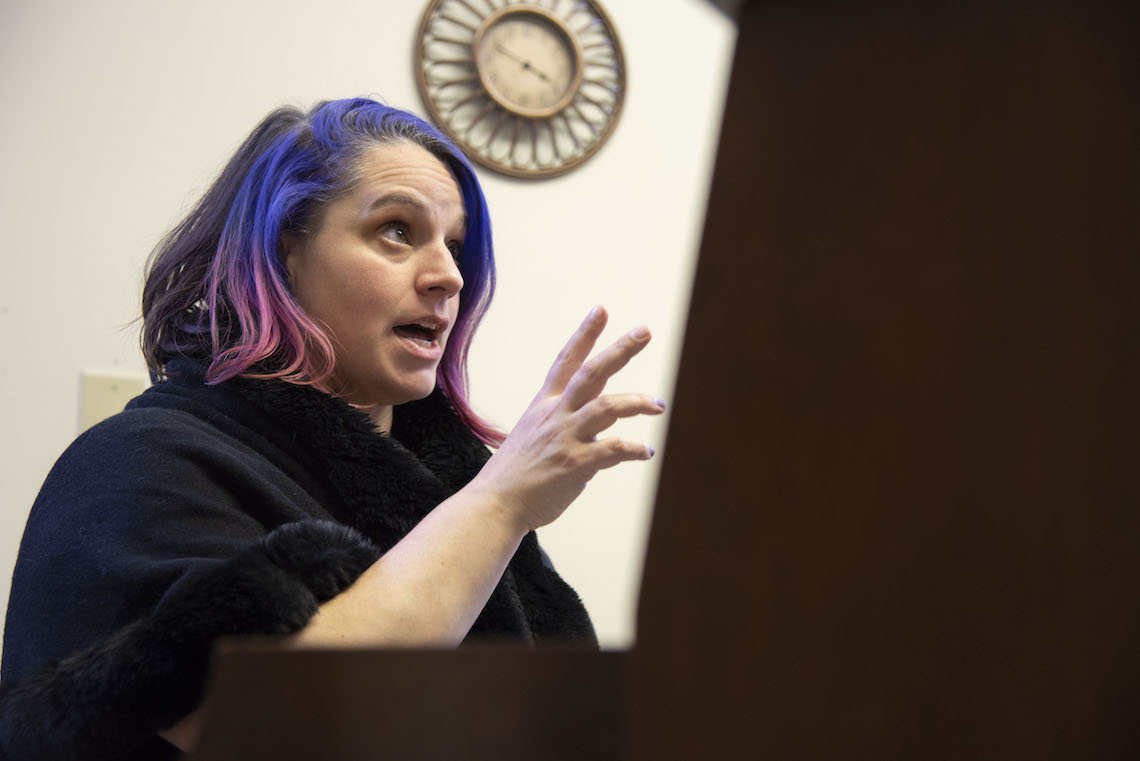
Meanwhile, the new life that Dietrich helped breathe into “X” shows no signs of fading. Opera companies across the country are following BMOP’s blueprint. Revivals have already been staged in Detroit and Omaha with more to come in Chicago and Seattle.
The casting in those productions also owes a debt to Dietrich with several of the performers that she handpicked for BMOP retaining their roles. In particular, the Metropolitan Opera in New York will feature a number of familiar voices from the recording session for a run of shows set to begin in November.
Staging an opera is a collaborative effort, and Dietrich sees herself as part of a team. But there is no denying the widespread and lasting impact of her the contributions to the art form that she loves so deeply.
“USM set me up for a level of work and motivation that I don’t know if I would have had had I gone to a different school,” Dietrich said.

